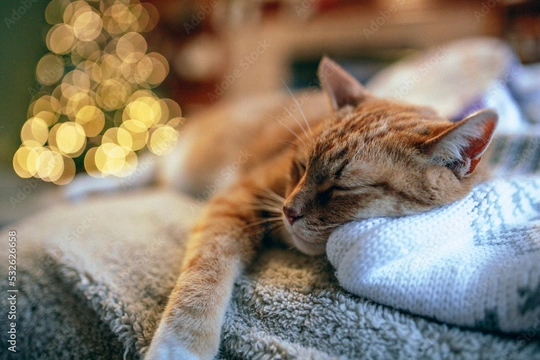
Do cats sleep more in winter?
The days are shorter, there’s a chill in the air and you might have noticed yourself cosying up more with a mug of hot tea, some candles and a good book. That’s normal in winter, right? You might be asking yourself if this applies to your cat too - do cats sleep more in winter? It’s sometimes hard to tell because let’s face it, cats sleep a lot anyway. Is this a case of us projecting our own snoozy feelings onto our furry felines? Let’s find out.
Do house cats sleep more in winter?
Generally, house cats will be less affected by light and dark changes than outdoor cats because they’re less exposed to the external environment. But, that doesn’t mean they aren’t affected at all. Most cats sleep on average 12-20 hours a day and if your cat spends a lot of time indoors and has a sedentary lifestyle, the sleep patterns in winter may not change so dramatically.
Cats are affected by different factors when it comes to sleep, both internal and external. If they notice a change in your sleep patterns in winter, they may follow suit. Like dogs, cats have become domesticated and their behavioural patterns are affected by those around them as well as the more in-built instinctive biological patterns.
Why do cats sleep more in the winter?
Cats sleep more in the winter for various reasons. Yes, they could be mirroring our winter behaviour to an extent and cosying up with us a bit more on the sofa. But there are other reasons why you might notice them being a little less active.
Winter is cold. Felines have a tendency to conserve energy in wintertime because historically there would have been less food. This natural fact will be written into their DNA and they still adhere to it. The cold can also disrupt their REM sleep, meaning that their sleep quality decreases and so they want to sleep longer to make up for this.
Winter is also darker and kitty circadian rhythms respond to diminished light in the same way humans’ do, by getting more snoozing in. So, to revisit the question ‘do indoor cats sleep more in the winter?’ The answer is: probably, but with outdoor cats there’s likely to be a more marked difference.
Some owners worry about the apparent lethargy their cats are displaying, so if you notice that your feline is especially void of energy, refusing to eat, not playing or interacting with you, or looking physically different, contact your veterinarian. Many owners also ask themselves the question: do cats get depressed in winter?
Do cats suffer from depression in winter?
The jury is out on this one. Some owners report that their kitties appear to have the blues, but it could be that we just project our own low mood onto our feline friends. Of course, it’s been proven that humans do suffer from seasonal affective disorder (SAD) and the production of hormones like serotonin and melatonin are reduced. There’s a school of thought that cats are affected similarly but it hasn’t been researched enough.
Because humans are so far removed from nature’s cycles, we tend to forget that animals still adhere to them. It’s ok to move about less when it’s dark and cold outside and animals have an ancestral remembering of why this might be important. That said, do take a trip to the vet if you feel that your cat’s behaviour is uncharacteristically different in winter or it’s showing signs of withdrawal or unhappiness.
Although cats don’t hibernate, they are responding to external changes as well as changes that are biologically imprinted for survival and ease. Perhaps we could learn something from them if we pay attention across the seasons.



